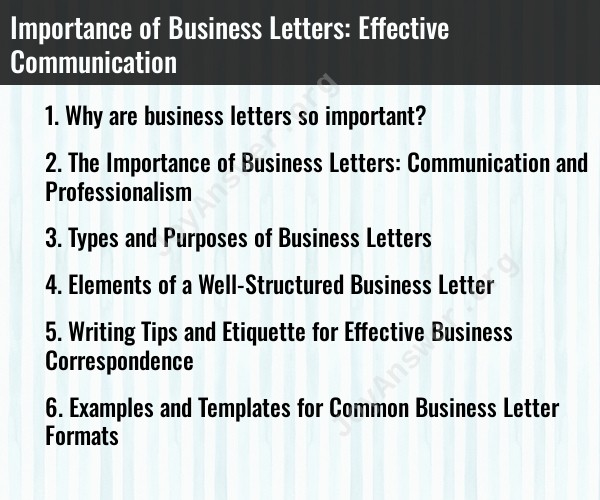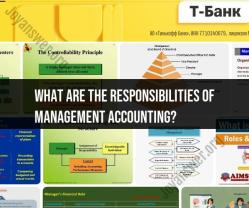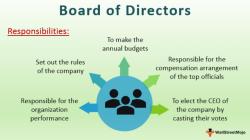Why are business letters so important?
Business letters are important for effective communication in a professional context for several reasons:
Formal Communication: Business letters are a formal means of communication in the business world. They convey professionalism and seriousness, making them appropriate for various official purposes.
Permanent Record: Business letters provide a written and dated record of the communication. This record can be valuable for legal, historical, or reference purposes.
Clarity and Precision: Well-crafted business letters are structured, organized, and follow a standard format. This clarity ensures that the message is understood accurately and reduces the likelihood of misunderstandings.
Legal Documentation: In many cases, business letters are used for legal purposes, such as contracts, agreements, and notices. Having written records is crucial in case disputes or legal issues arise.
Official Communication: They are often required for communication with external entities, government agencies, or other organizations. For example, letters to regulatory bodies, tax authorities, or government agencies must be in a formal written format.
Professional Image: Sending a well-composed business letter reflects positively on an organization's professionalism and attention to detail. It can enhance the reputation of the sender.
Global Communication: Business letters can transcend language barriers. They can be translated for international communication and are often used for official communication between organizations in different countries.
Customization: Business letters can be tailored to address the specific needs of the recipient, including salutations, subject matter, and tone. This customization helps build rapport and trust.
Credibility: Written communication often carries more weight and credibility compared to verbal communication. It's less prone to misunderstanding and misinterpretation.
Politeness and Etiquette: Business letters emphasize politeness and adherence to etiquette. They ensure that communication is conducted with respect and professionalism.
Record of Commitments: When agreements or commitments are made in a business letter, they serve as a written promise. This can help hold parties accountable for their obligations.
Official Documentation: They are used for various official documents, such as letters of recommendation, resignation letters, job offers, and more. These letters are often required by HR departments and serve as official records.
Structured Communication: Business letters follow a structured format, which typically includes sender's and recipient's addresses, date, salutation, body, and closing. This structure helps ensure that all necessary information is included and presented coherently.
Dissemination of Information: They are used to disseminate important information within an organization, such as policy changes, announcements, and updates. This ensures that everyone receives the same information simultaneously.
In summary, business letters are essential for clear, formal, and professional communication in the business world. They serve as a written record, contribute to professionalism, and play a critical role in legal and official documentation. Properly written business letters are a valuable tool for conveying information, making requests, and building relationships in a professional context.
The Importance of Business Letters: Communication and Professionalism
Business letters play a vital role in professional communication and relationship building. They serve as a formal way to communicate with clients, customers, colleagues, and other stakeholders. Business letters can be used to convey information, conduct business transactions, and build rapport.
Well-written business letters are clear, concise, and professional. They reflect positively on the sender and the organization they represent.
Types and Purposes of Business Letters
There are many different types of business letters, each with its own specific purpose. Some common types of business letters include:
- Cover letters: Cover letters are used to introduce yourself to potential employers and express your interest in a job opening.
- Resumes: Resumes are used to summarize your skills and experience for potential employers.
- Reference letters: Reference letters are written by former employers or colleagues to endorse your skills and experience.
- Inquiry letters: Inquiry letters are used to request information from a business or organization.
- Sales letters: Sales letters are used to promote products or services to potential customers.
- Complaint letters: Complaint letters are used to express dissatisfaction with a product or service.
- Thank-you letters: Thank-you letters are used to express gratitude for a business transaction, favor, or gift.
Elements of a Well-Structured Business Letter
All business letters should include the following elements:
- Header: The header includes the sender's contact information, such as name, address, and phone number, as well as the recipient's contact information.
- Date: The date should be written in the following format: month, day, year.
- Salutation: The salutation is a formal greeting, such as "Dear Mr. Smith" or "Dear Ms. Jones."
- Body: The body of the letter is where you communicate your message. It should be clear, concise, and professional.
- Closing: The closing is a formal farewell, such as "Sincerely" or "Best regards."
- Signature: The signature should be handwritten and include the sender's full name.
Writing Tips and Etiquette for Effective Business Correspondence
Here are some writing tips and etiquette for effective business correspondence:
- Use a professional tone: Avoid using informal language or slang.
- Be clear and concise: Get to the point quickly and avoid using unnecessary jargon.
- Proofread carefully: Make sure your letter is free of errors in grammar and spelling.
- Use a standard font and font size: Avoid using fancy fonts or font sizes that are too large or too small.
- Use white space effectively: Don't crowd your letter with text. Use white space to make it easy for the reader to scan.
Examples and Templates for Common Business Letter Formats
Here are some examples and templates for common business letter formats:
- Cover letter template: [Cover Letter Template]
- Resume template: [Resume Template]
- Reference letter template: [Reference Letter Template]
- Inquiry letter template: [Inquiry Letter Template]
- Sales letter template: [Sales Letter Template]
- Complaint letter template: [Complaint Letter Template]
- Thank-you letter template: [Thank-You Letter Template]
You can use these templates as a starting point for writing your own business letters. Be sure to tailor each letter to the specific recipient and purpose.











